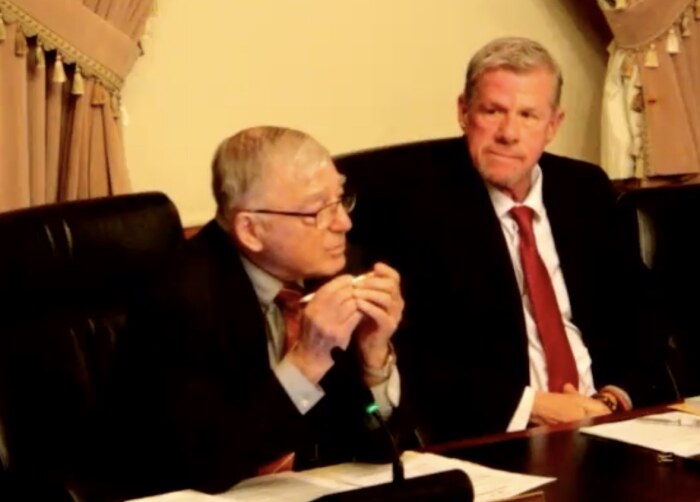A proposal to reinstate capital punishment was among the bills that did not clear the Iowa legislature’s second “funnel” before the March 31 deadline.
Comments from key Iowa House Republicans make clear the bill is not only doomed for the 2023 legislative session, but for the foreseeable future.
Iowa abolished the death penalty in 1965, the first year of a Democratic trifecta under Governor Harold Hughes. Although legislators have periodically introduced bills to reinstate capital punishment, those have rarely advanced.
Neither chamber has held a floor vote on the death penalty since 1995, when the Iowa House approved such legislation (which had the backing of then Governor Terry Branstad), but the Iowa Senate voted it down. The 1995 bill defined capital murder as first degree murder by someone who has already committed certain class A felonies, or who murders someone else in the process of committing a first-degree murder.
This year’s proposal is more limited. Senate File 14 would create a capital murder offense if someone who is at least 18 years old and “not intellectually disabled or mentally ill” kidnapped, sexually abused, and murdered a child. The bill outlines procedures for prosecuting and reviewing capital murder cases. Any execution would take place by lethal injection.
Senate Judiciary Committee chair Brad Zaun, a longtime supporter of the death penalty, introduced this year’s bill. Zaun’s committee approved a similar bill in 2019, but the measure never came to a Senate floor vote.
Senate File 14 prompted a spirited debate during the Judiciary Committee’s February 21 meeting. Republican State Senator Julian Garrett argued the bill would save innocent lives, because under current law, the penalty for kidnapping and raping a child (life in prison) is the same as the maximum penalty for someone who goes on to murder that child. He claimed that creates an incentive to kill child victims.
Democratic State Senator Tony Bisignano, a longtime opponent of capital punishment, questioned the logic of this proposal. What if he kidnaps and murders children, but doesn’t rape them? He wouldn’t be subject to the death penalty.
Garrett acknowledged he would be open to a broader definition of capital murder offenses. He said the proposal was more targeted because “we understand how difficult it is to pass a death penalty bill.” Many other hypothetical cases might justify the death penalty, “but given how difficult it is to get a bill passed in this legislature, we’re narrowing it down as much as we possibly can.”
Bisignano likened Senate File 14 to “the first step of falling down the stairs.” The obvious goal, he said, is to get capital murder into Iowa Code, and then come back every year to include other heinous crimes.
Bisignano and other Judiciary Committee Democrats, including Senators Nate Boulton, Janet Petersen, and Janice Weiner, mentioned wrongful convictions that have resulted in executions or prisoners spending many years on death row. (Garrett contended that the error rate is “minuscule.”) Senator Herman Quirmbach cited evidence suggesting that the death penalty does not deter crime.
Two Republicans (Lynn Evans and Jeff Taylor) voted with Democrats against Senate File 14 on the Judiciary Committee. Since leaders never brought the bill to the floor, so it’s not clear whether a majority of Iowa senators favor bringing back the death penalty. (Republicans hold a 34-16 majority in the chamber, so can afford to lose up to eight GOP votes on any bill.) The lobbyist declarations show more than a dozen entities registered against Senate File 14. Historically, the Iowa Catholic Conference has been a particularly important voice against reinstating capital punishment.
Even if the Iowa Senate did approve this bill or something like it next year, any death penalty proposal would go nowhere in the lower chamber.
House Judiciary Committee Chair Steven Holt would be the first roadblock. When chairing a subcommittee on a death penalty bill in 2018, Holt “surprised onlookers,” the Des Moines Register’s Brianne Pfannenstiel reported at the time.
“My conclusion after researching this bill was not exactly what I expected,” [Holt] said. “I support the death penalty in theory and believe it is absolutely morally OK based upon my faith. But I have great issues with its practical and prudent and fair application.”
That bill stalled because then Public Safety Committee chair Clel Baudler did not have the votes to bring it out of committee.
Speaking to the Des Moines Register in February of this year, Holt gave other reasons not to open this door.
Holt, R-Denison, said sentencing someone to death can be more expensive for taxpayers than sentencing that person to a life sentence. He also recognized that high-income defendants were far less likely to receive the death penalty than someone relying on a public defender.
“And then there was a concern I have, frankly, that sometimes people are wrongly convicted, and there is DNA evidence now that has exonerated a number of people that were on death row,” Holt said. “Well, once those people are put to death you can’t reverse that mistake, but you certainly could reverse it when the person would be serving life in prison.”
As long as Holt remains in charge of the House Judiciary Committee, he will be able to keep any death penalty legislation from moving out of his panel.
Since the 2018 bill was assigned to the House Public Safety Committee, I sought comment from current Public Safety chair Phil Thompson. He confirmed to Bleeding Heartland on March 30 that he has “no interest” in moving any death penalty bill, even a limited one. Thompson explained that he supports protecting life “from conception to natural death.”
Top photo: State Senator Julian Garrett (left) advocates for a death penalty bill during a February 21 Judiciary Committee meeting, while committee chair Brad Zaun looks on. Screenshot from official legislative video.


1 Comment
Holt
I am surprised to learn Holt departs from the norm on death penalty. I wonder where that’s coming from?
iowagerry Wed 5 Apr 12:17 PM